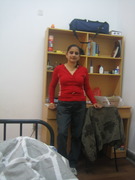My niece recently went through a hard time with one of the most severe forms of Dengue fever. She was hospitalized for almost 15 days and observed for Dengue hemorrhagic symptoms. Luckily she got better and was released subsequently.
Dengue fever is a disease that is caused by a family of viruses transmitted through a kind of striped mosquito called Aedes aegypti. It usually attacks people with lower immunity levels. Dengue fever is also called break bone fever (due to the fact it affects joints and muscles for several months to years sometimes) and Dandy fever.
Dengue fever usually starts with symptoms including headache, fever, fatigue, muscle weakness, joint pains, and swollen glands( lymphadenopathy). The main symptoms include joint pains and rash. Other symptoms that are characteristic of hemorrhagic Dengue fever are bleeding gums, pain behind the eyes, blisters under the skin, nose bleeds, black stools and bruising. Dengue could recur several times, and some people with hemorrhagic Dengue fever could sometimes end up with Dengue shock syndrome for life.
Dengue usually is a tropical and subtropical disease. The countries and regions that this disease is more prevalent in include India, South East Asia, the Carribbean, Puerto Rico, Cuba, Central America, Singapore, and the Middle East, among others. This virus is as prevalent as other mosquito infested viruses such as malaria, and yellow fever. It usually spreads through the mosquito bites that carry the infection. Standing water, a rainy season and any stagnated body of water is the feeding ground for the mosquitoes. Dengue fever is not contagious.
Symptoms for Dengue continue for three to five days and usually starts with chills, headaches, and pain in the eyes and lower back. Temperature could rise sharply with lowered heart rate and blood pressure. It lasts for two to three days with a rapid drop in temperature and sweating. While no particular treatment for this fever is known, plenty of rest and fluid intake is recommended along with anti inflammatory drugs, aspirin, and Tylenol and codeine for pain reduction.
Dengue hemorrhagic fever usually affects children under 10, according to Web MD.com. This usually is symptomatic with bleeding, circulatory collapse or shock. Sore throat, cough, nausea, vomiting, blood spots, bruising, spitting blood, black stools, bleeding from the gums, pneumonia, and inflammation of the heart are some of the other symptoms.
Treatment for the hemorrhagic fever is oxygen for cyanosis, fluid replacement, and blood transfusions. Prevention for the fever is recommended with mosquito nets, clearing stagnant waters, wearing long sleeved shirt and pants, using repellents, and staying indoors during dawn and dusk times. While there is no vaccination for the Dengue fever, plenty of rest and prevention methods for people traveling to these countries would help survive the disease and have a safe and happy journey because, OUR LIFE MATTERS.





Add a Comment1 Comments
Treatment of acute dengue is supportive, using either oral or intravenous rehydration for mild or moderate disease, and intravenous fluids and blood transfusion for more severe cases. The number of cases of dengue fever has increased dramatically since the 1960s, with between 50 and 528 million people infected yearly.
May 24, 2014 - 9:28amThis Comment